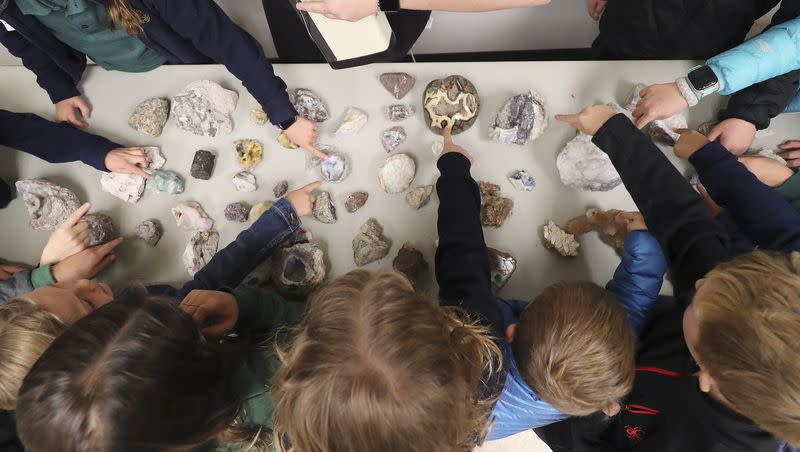State school board votes 8-7 to restore climate change to latest science standards

Climate change was restored to Utah’s supplemental state standards for science and engineering education by one vote late Thursday night.
The Utah State Board of Education voted 8-7 to accept the proposed standards as written by a committee of educators, scientists and parents.
The vote, which capped a nearly 14-hour board meeting, eliminated all previous amendments to the science and engineering curriculum, one of which purged climate change language.
Board member Brent Strate, who introduced the motion to accept the supplemental standards as written, said the board had approved science standards in 2019 that included climate change as part of environmental science instruction.
“So to me, I feel very comfortable with what came out of the writing committee. My rule, what I always said when I was on the Standards Committee, if it’s an amendment, if it isn’t better, I’m not considering it. It could be equal and we’d have a long debate about it, but it has to be absolutely better or I’m not going to vote in favor,” Strate said.
Board vice chairwoman Jennie Earl spoke against the motion.
“I think we’ve done a lot of work and I think we can continue to do that,” she said. “Supplemental to me is that these are additional standards. There’s not a set of standards for any of those that we will be passing in this area. This is the first time we’ve had standards in this area.”
Earl, a member of the Standards and Assessment Committee that passed the amended proposed standards to the board, made an amendment to remove language that called for students to be taught how to evaluate proposed designed solutions intended to reduce the impacts of climate change. It passed by a 3-2 vote.
The board briefly considered postponing final consideration of the standards to a special meeting or resuming debate the following day but neither proposal had traction with the board.
Ultimately, it voted to accept the writing committee’s report sans any amendments.
On Thursday morning, several community members urged the elected board to restore climate change language to the supplemental standards. At least 100 others sent board members emails expressing their concerns.
Christi Leman of Provo, the mother of two teenagers, told the board that the amendments “send a message to students that the state does not acknowledge evidence widely accepted by climatologists worldwide as well as by our own Legislature, our Department of Public Safety and our Division of Fire, Forestry and State Lands.”
Leman said the changes would deprive students “of a safe place to learn and discuss their living environment as well as critically think about possible solutions to environmental problems which would be detrimental to our children as citizens of Utah and of the world.”
Dr. Robert Cheatham, a pediatric intensive care physician, said he had never before addressed an elected body but he came to the board meeting “to express my extreme dismay at this new standard that’s going to replace the word climate change with cataclysmic events indicating that it’s more of a natural phenomenon that’s occurring.”
Cheatham said amendments to the proposed standards represent a departure from what is widely accepted science.
“I just ask that you consider the change as something that will affect our students’ ability to handle the world as it is in reality, and it’s going to become more and more of an issue for the generations facing us ahead,” he said.
Rep. Gay Lynn Bennion, D-Cottonwood Heights, said she was particularly concerned about students being able to analyze and interpret data that can help them learn about the interactions between society and the climate.
“Regardless of where you live, the Great Salt Lake is of international concern. This is true for all saline lakes throughout the world and this is because of higher temperatures year after year that are drying up these lakes. It is important that our students have a science background to understand these changes,” Bennion said.
The board’s Standards and Assessment Committee, which is comprised of elected state school board members, has met twice in recent weeks to consider dozens of amendments to the proposed science standards and sent the amended standards to the full board for its consideration.
Some changes purged mentions of climate change from the document while others sought to include alternative theories about how rocks formed, such as the impact of the Great Flood described in the Book of Genesis. The latter did not receive committee approval.
During a committee meeting April 25, State School Board member Natalie Cline said she speaks for “many” people who do not agree with the “climate change agenda or narrative.”
Member Sarah Reale said students are aware of the impacts of climate change and conditions due to the groundswell of public attention on the depleted Great Salt Lake, or that on occasion they do not get to have recess outdoors when the air quality is poor.
“I don’t want to make it political. It’s facts. It’s evidence that they’re (students) seeing in front of their eyes, and I want to make sure that that’s included in our standards,” she said.
The board voted to approve several other standards on Thursday:
College and Career Awareness, and Digital Literacy standards.
Supplemental standards for creative writing, professional and technical communication, human anatomy, genetics, geology, marine biology/oceanography, meteorology, and humanities.

